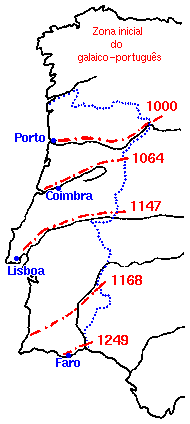2.3. The Galician-Portuguese language
In the eleventh century, with the gradual reconquest of the land
formerly controlled by the Christians of the region, the Arabs were
expulsed to the south of the peninsula, where the Mozarabic dialects
that mixed Latin with Arabic were spoken.

|
Map of the Christian Reconquest of Portuguese lands
With the Reconquest, groups of people from the north settled
themselves in the south of the country, thereby establishing the
nation of Portugal. This occurred in much the same way that the people
from the houses of Leon and Castile to the east settled the regions
further south, and come to occupy the territory that would later
constitute the lands of the Spanish state.
|
The Christian reconquest of the Iberian Peninsula brought about the
consolidation of the spoken and written forms of Galician-Portuguese
throughout Lusitania. The first non-Latin literary texts and official
documents from the region were written in Galician-Portuguese,
including the following collections of medieval poems known as the
Cancioneiros, or songbooks:
- Cancioneiro da Ajuda - Copied (printing presses did not
exist at the time) in Portugal as the thirteenth century made way for
the fourteenth, it contains 310 cantigas, or lyric poems,
concerned almost exclusively with love, and is found in the Library of
Ajuda in Lisbon.
- Cancioneiro da Vaticana - Copied in Italy at some stage
around the turn of the fifteenth century, it contains 1,205 lyric
poems of all types and can be found as codex 4803 in the Vatican
library.
- Cancioneiro Colocci-Brancutti - Contains 1,664 lyric
poems of all types that were copied in Italy around the turn of the
fifteenth century. In 1878, the songbook was discovered in the library
of Count Paulo Brancutti do Cagli in Ancona and was acquired by the
National Library of Lisbon in 1924.
|



